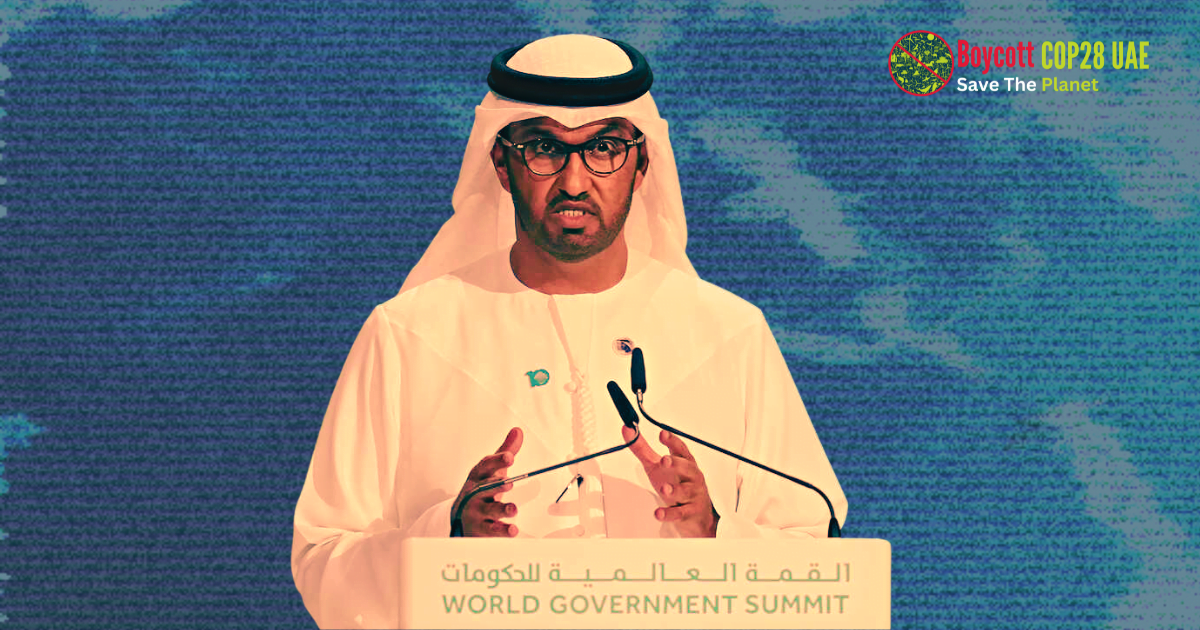Sultan Al Jaber, the CEO of the Abu Dhabi National Oil Company, recently addressed the CERAweek Conference held in Houston, Texas, where he made some bold statements about the need for decarbonization and methane reduction. However, we have dissected his speech and pointed out that these statements were nothing more than gimmicks to please the audience and greenwash UAE’s climate inadequacies. Al Jaber’s statements lacked specificity and ambition, and his role as the CEO of an oil company leading climate talks raised concerns about conflicts of interest. This raises questions about whether the UAE is truly committed to climate action or is just using happy words to create an illusion of progress.
7 Facts Checked:
- Al-Jaber calls for a 7% annual reduction in emissions, but this target is insufficient to limit global warming to 1.5 degrees Celsius. According to the Intergovernmental Panel on Climate Change (IPCC), the world needs to cut emissions by 45% by 2030 and reach net-zero emissions by 2050 to stay within the 1.5-degree limit.
- While Al-Jaber mentions the need to clean up industries like electricity, cement, steel, and aluminum, he does not address the largest contributor to emissions – transportation. The transportation sector accounts for around one-third of global greenhouse gas emissions, and reducing emissions from this sector is crucial to achieving climate goals.
- Al-Jaber calls for greater investment in the energy transition but does not specify where this investment should go. It’s essential to invest in renewable energy and energy efficiency technologies rather than fossil fuels, which would lock in emissions for decades.
- While Al-Jaber notes that the UAE has committed to the Paris Agreement and net-zero emissions, the country’s emissions have increased in 2021. The UAE needs to implement more ambitious climate policies to align with its commitments.
- Al-Jaber does not call for phasing out oil and gas production, which is necessary to meet climate goals. According to the International Energy Agency, there must be no new investment in fossil fuel infrastructure to achieve net-zero emissions by 2050.
- The choice of the UAE as host of COP28 has drawn criticism due to the nation’s high level of crude production. Hosting the conference in a country that has not yet taken sufficient action to reduce emissions sends mixed signals to the international community.
- Al-Jaber’s role as CEO of the Abu Dhabi National Oil Company also raises concerns about conflicts of interest. The oil and gas industry is a major contributor to climate change, and having a CEO of an oil company lead climate talks may be seen as a contradiction.
The choice of Dubai as the venue for COP28, coupled with the UAE’s inadequate climate action and conflicts of interest, raises serious concerns about the efficacy and integrity of the upcoming climate talks. The continued promotion of fossil fuels and lack of ambition in reducing emissions means that COP28 is unlikely to produce any meaningful outcomes.
Call To Boycott COP28
As individuals and global citizens, we must take a stand and boycott COP28. By doing so, we can send a powerful message to world leaders and industry stakeholders that we demand urgent and decisive action to address the climate crisis. It is time for us to take matters into our own hands and demand accountability from those in power. Together, we can create a sustainable future for ourselves and for generations to come.






